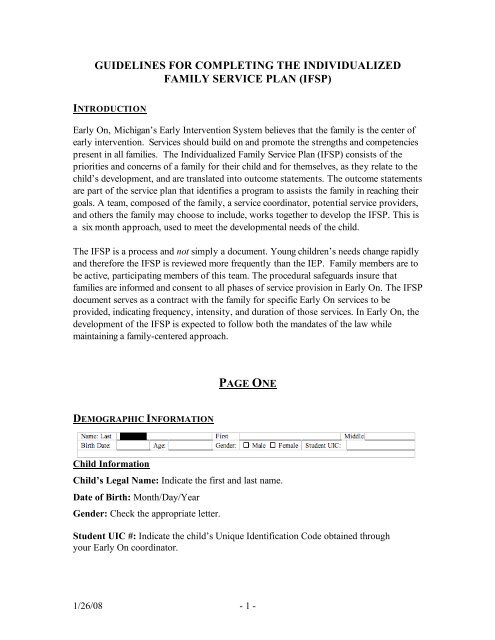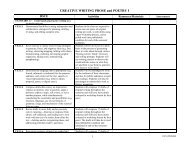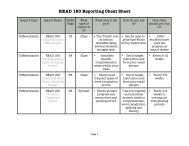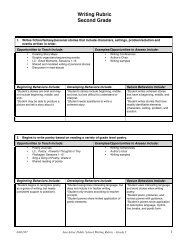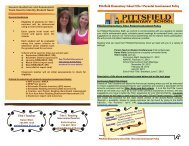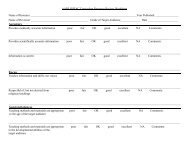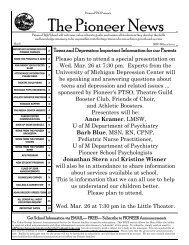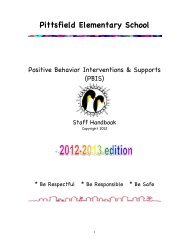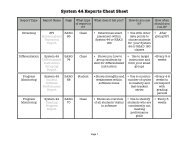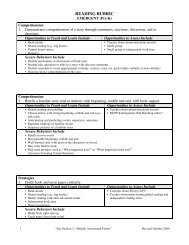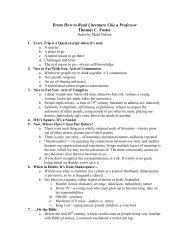guidelines for completing the individualized family service plan (ifsp)
guidelines for completing the individualized family service plan (ifsp)
guidelines for completing the individualized family service plan (ifsp)
You also want an ePaper? Increase the reach of your titles
YUMPU automatically turns print PDFs into web optimized ePapers that Google loves.
GUIDELINES FOR COMPLETING THE INDIVIDUALIZED<br />
FAMILY SERVICE PLAN (IFSP)<br />
INTRODUCTION<br />
Early On, Michigan’s Early Intervention System believes that <strong>the</strong> <strong>family</strong> is <strong>the</strong> center of<br />
early intervention. Services should build on and promote <strong>the</strong> strengths and competencies<br />
present in all families. The Individualized Family Service Plan (IFSP) consists of <strong>the</strong><br />
priorities and concerns of a <strong>family</strong> <strong>for</strong> <strong>the</strong>ir child and <strong>for</strong> <strong>the</strong>mselves, as <strong>the</strong>y relate to <strong>the</strong><br />
child’s development, and are translated into outcome statements. The outcome statements<br />
are part of <strong>the</strong> <strong>service</strong> <strong>plan</strong> that identifies a program to assists <strong>the</strong> <strong>family</strong> in reaching <strong>the</strong>ir<br />
goals. A team, composed of <strong>the</strong> <strong>family</strong>, a <strong>service</strong> coordinator, potential <strong>service</strong> providers,<br />
and o<strong>the</strong>rs <strong>the</strong> <strong>family</strong> may choose to include, works toge<strong>the</strong>r to develop <strong>the</strong> IFSP. This is<br />
a six month approach, used to meet <strong>the</strong> developmental needs of <strong>the</strong> child.<br />
The IFSP is a process and not simply a document. Young children’s needs change rapidly<br />
and <strong>the</strong>re<strong>for</strong>e <strong>the</strong> IFSP is reviewed more frequently than <strong>the</strong> IEP. Family members are to<br />
be active, participating members of this team. The procedural safeguards insure that<br />
families are in<strong>for</strong>med and consent to all phases of <strong>service</strong> provision in Early On. The IFSP<br />
document serves as a contract with <strong>the</strong> <strong>family</strong> <strong>for</strong> specific Early On <strong>service</strong>s to be<br />
provided, indicating frequency, intensity, and duration of those <strong>service</strong>s. In Early On, <strong>the</strong><br />
development of <strong>the</strong> IFSP is expected to follow both <strong>the</strong> mandates of <strong>the</strong> law while<br />
maintaining a <strong>family</strong>-centered approach.<br />
PAGE ONE<br />
DEMOGRAPHIC INFORMATION<br />
Child In<strong>for</strong>mation<br />
Child’s Legal Name: Indicate <strong>the</strong> first and last name.<br />
Date of Birth: Month/Day/Year<br />
Gender: Check <strong>the</strong> appropriate letter.<br />
Student UIC #: Indicate <strong>the</strong> child’s Unique Identification Code obtained through<br />
your Early On coordinator.<br />
1/26/08 - 1 -
Name of Parent/Guardian/Surrogate Parent: It is important to be respectful of <strong>the</strong><br />
various <strong>family</strong> constellations that are possible as in<strong>for</strong>mation about <strong>the</strong> <strong>family</strong> is<br />
obtained. It is only necessary to write <strong>the</strong> name and address of one adult who is<br />
responsible <strong>for</strong> <strong>the</strong> child, but more may be written if <strong>the</strong> <strong>family</strong> wishes. Indicate <strong>the</strong><br />
relationship of <strong>the</strong> adult to <strong>the</strong> child after <strong>the</strong> adult’s name (e.g. Lenny Adams -<br />
grandfa<strong>the</strong>r, or Rosalie Barker - mo<strong>the</strong>r). If <strong>the</strong> child lives with a foster parent, guardian,<br />
or surrogate, <strong>the</strong>ir name(s) and relationship to <strong>the</strong> child should be indicated. The date of<br />
birth is optional.<br />
Reminder: When a child lives with someone o<strong>the</strong>r than a parent or legal guardian, that<br />
person may not be able to give <strong>the</strong> consent required <strong>for</strong> initiation of <strong>service</strong> or <strong>for</strong><br />
consent to evaluate. Check with <strong>the</strong> agency that placed <strong>the</strong> child in that home.<br />
The term ‘parent’ means –<br />
(A) a natural, adoptive, or foster parent of a child (unless a foster parent is prohibited by State law<br />
from serving as a parent). Note: a foster parent must have a long-standing relationship (at<br />
least 6 months) with <strong>the</strong> student or a surrogate parent needs to be appointed to attend <strong>the</strong><br />
IEPT meeting as <strong>the</strong> student’s parent.<br />
(B) a guardian (but not <strong>the</strong> State if <strong>the</strong> child is a ward of <strong>the</strong> State, this means a person employed<br />
by <strong>the</strong> State of Michigan may not sign as <strong>the</strong> guardian);<br />
(C) an individual acting in <strong>the</strong> place of a natural or adoptive parent (including a grandparent,<br />
stepparent, or o<strong>the</strong>r relative) with whom <strong>the</strong> child lives, or an individual who is legally<br />
responsible <strong>for</strong> <strong>the</strong> child’s welfare; or<br />
(D) except as used in sections 615(b)(2) and 639(a)(5), an individual assigned under ei<strong>the</strong>r of<br />
those sections to be a surrogate parent [H.R. 1350 §602(23)]<br />
Phone (home): If <strong>family</strong> doesn’t have a phone, ask whe<strong>the</strong>r <strong>the</strong>re’s a relative, neighbor,<br />
or friend who can take messages. If this is <strong>the</strong> case, indicate <strong>the</strong> relationship in<br />
paren<strong>the</strong>ses after <strong>the</strong> phone number [e.g., 245-8560 (neighbor)].<br />
O<strong>the</strong>r Phone (e.g., cell, daycare, relative, work): If applicable.<br />
Email Address: Indicate <strong>the</strong> families email address if desired<br />
Address: Indicate <strong>the</strong> complete home address, including an apartment number if<br />
applicable and <strong>the</strong> City/State/Zip Code.<br />
City/State of Birth: Indicate <strong>the</strong> city in which <strong>the</strong> child was born. This in<strong>for</strong>mation can<br />
be found on <strong>the</strong> child's birth certificate or from <strong>the</strong> parent.<br />
1/26/08 - 2 -
School District of Residence: If <strong>the</strong> <strong>family</strong> isn’t sure, <strong>the</strong> Intermediate School District<br />
can be contacted to verify eligibility <strong>for</strong> <strong>service</strong>s within <strong>the</strong> ISD. If residence is within<br />
ano<strong>the</strong>r ISD, contact <strong>the</strong> appropriate school district to inquire about <strong>service</strong>s. The school<br />
district will also need <strong>the</strong> registry in<strong>for</strong>mation and copies of <strong>the</strong> IFSPs, etc. <strong>for</strong> that child.<br />
If <strong>the</strong> IFSP is also an IEP, note <strong>the</strong> district which operates <strong>the</strong> Special Education<br />
program or <strong>service</strong>.<br />
The name of <strong>the</strong> district which is <strong>the</strong> resident district <strong>for</strong> <strong>the</strong> purposes of providing a free<br />
and appropriate public education per R 340.1732, 1721c, 388.1705(18).<br />
Ethinicity : Check one of <strong>the</strong> boxes of <strong>the</strong> provided options.<br />
Our Preferred Language Is: If <strong>the</strong> parent/child’s native language is not English, and<br />
English is not a language he/she understands, fill in <strong>the</strong> blank. If <strong>the</strong> parent/child will<br />
need an interpreter, specify <strong>the</strong> language.<br />
Interpreter Needed: If <strong>the</strong> <strong>family</strong> needs an interpreter to understand English, if <strong>the</strong>ir<br />
mode of communication is sign language, or if o<strong>the</strong>r circumstances exist that make an<br />
interpreter necessary, this in<strong>for</strong>mation must be included.<br />
REFERRAL INFORMATION<br />
Date of Referral: Indicate <strong>the</strong> date of <strong>the</strong> referral (month/day/year) to request a Part C<br />
evaluation. A referral is made when contact by a <strong>family</strong> is made with <strong>the</strong> Ann Arbor<br />
Public Schools Early On Coordinator. The referral date must be within two working<br />
days of <strong>the</strong> date that <strong>the</strong> child was identified (i.e., A <strong>service</strong> provider had sufficient<br />
in<strong>for</strong>mation to suspect that <strong>the</strong> child was Part C eligible, usually <strong>the</strong> date that <strong>the</strong> inquiry<br />
about <strong>service</strong>s took place).<br />
Consent to Evaluate Date: Indicate <strong>the</strong> date <strong>the</strong> parent(s) signed consent <strong>for</strong> Early On<br />
evaluation to take place. When <strong>the</strong> evaluation is a special education evaluation follow<br />
<strong>the</strong> same procedures in Sections 4, Special Education Referrals in this manual. If <strong>the</strong>re<br />
1/26/08 - 3 -
is a delay between <strong>the</strong> time a parent signs <strong>the</strong> Consent to Evaluate and <strong>the</strong> time <strong>the</strong> child<br />
is seen <strong>for</strong> a special education evaluation an Initial Student Referral must be signed as<br />
well as <strong>the</strong> Consent to Evaluate in order to maintain compliance. For example, if a child<br />
has been seen by an Early On <strong>service</strong> provider <strong>for</strong> a couple of months and <strong>the</strong>y decide a<br />
special education evaluation is needed, <strong>the</strong> special education staff will follow procedures<br />
outlined in Section 4, Special Education Referrals, of this manual.<br />
Referred By: Identify <strong>the</strong> person who made <strong>the</strong> request <strong>for</strong> an evaluation. This may be a<br />
parent or <strong>service</strong> provider. Anyone may make a referral, but <strong>the</strong> evaluation cannot be<br />
done until parental consent is given.<br />
Interim IFSP: The purpose of an interim IFSP is to expedite <strong>service</strong>s when <strong>the</strong>y are<br />
needed immediately and <strong>the</strong> child/<strong>family</strong> cannot wait <strong>for</strong> <strong>the</strong> evaluation and assessment<br />
to be completed in <strong>the</strong> 45 calendar day period (e.g., when an infant is being discharged<br />
from a hospital). Interim IFSP meetings may also be held because of extenuating <strong>family</strong><br />
circumstances--when <strong>completing</strong> <strong>the</strong> evaluation within 45 calendar days is not possible<br />
(e.g., because <strong>the</strong> child is ill). Such circumstances must be documented. All interim<br />
IFSPs must include <strong>the</strong> name of <strong>the</strong> <strong>service</strong> coordinator and <strong>the</strong> <strong>service</strong>s that are needed<br />
immediately and be signed by <strong>the</strong> parent(s) be<strong>for</strong>e <strong>service</strong>s begin.<br />
Initial IFSP: Indicate <strong>the</strong> date of <strong>the</strong> IFSP meeting (month/day/year). The IFSP meeting<br />
must be held within 45 calendar days of <strong>the</strong> referral date unless extenuating <strong>family</strong><br />
circumstances make it impossible to hold <strong>the</strong> meeting within that time period. If a delay<br />
is necessary, ask <strong>the</strong> <strong>family</strong> whe<strong>the</strong>r <strong>the</strong>y would like to have an interim IFSP developed<br />
or sign an extension to <strong>the</strong> 45day timeline.<br />
30 Day Placement: For students new to a district who have a current IFSP from ano<strong>the</strong>r<br />
district, and was receiving special education <strong>service</strong>s.<br />
Previous enrollment in special education.<br />
Rule 22e. (1) If a student who currently receives special education programs or <strong>service</strong>s enrolls in a<br />
new school district, <strong>the</strong>n <strong>the</strong> new school district shall do ei<strong>the</strong>r of <strong>the</strong> following:<br />
(a) With <strong>the</strong> parent's consent, immediately implement <strong>the</strong> student's current <strong>individualized</strong><br />
education program.<br />
(b) With <strong>the</strong> parent's consent, immediately place <strong>the</strong> student in an appropriate program or<br />
<strong>service</strong> and convene an <strong>individualized</strong> education program team meeting within 30 school<br />
days to develop an<br />
<strong>individualized</strong> education program.<br />
Special circumstances which delayed <strong>the</strong> IFSP <strong>for</strong> more that 45 days after referral:<br />
There must be reason indicated if <strong>the</strong> IFSP was help more than 45 days after <strong>the</strong> referral<br />
was received. Select a reason from <strong>the</strong> drop down menu.<br />
6 Month Review: IFSP's must be reviewed every six months, or more frequently if<br />
conditions warrant or <strong>the</strong> <strong>family</strong> so requests, to review progress on outcomes and whe<strong>the</strong>r<br />
notification/revisions of <strong>service</strong>s is necessary. While periodic reviews do not request a<br />
meeting of <strong>the</strong> participants and could be conducted by phone conference or some o<strong>the</strong>r<br />
acceptable means, periodic reviews should be documented and summarized on <strong>the</strong> IFSP<br />
1/26/08 - 4 -
Transition: An IFSP meeting must be held to <strong>plan</strong> <strong>for</strong> <strong>the</strong> transition of a child from Early<br />
On to preschool or o<strong>the</strong>r appropriate <strong>service</strong>s at approximately age three or on o<strong>the</strong>r<br />
occasions when a child will no longer receive Early On <strong>service</strong>s, such as ineligibility,<br />
parental decision to terminate participation, etc. Transition <strong>plan</strong>ning must begin at least<br />
90 calendar days be<strong>for</strong>e <strong>the</strong> child’s third birthday and may begin up to 6 months prior<br />
to transition. See Transition <strong>plan</strong>ning in this section <strong>for</strong> fur<strong>the</strong>r instructions.<br />
Exit Date: Indicate date in which <strong>the</strong> child was exited from Early On <strong>service</strong>s. Attach<br />
<strong>the</strong> Early On Exit Form to document.<br />
ELIGIBILITY<br />
Eligibility <strong>for</strong> Early On: Check whe<strong>the</strong>r or not child is eligible <strong>for</strong> Early On <strong>service</strong>s. If<br />
eligible, note <strong>the</strong> established condition and area(s) of developmental delay. If <strong>the</strong> child<br />
has an established condition select from <strong>the</strong> drop down menu provided. If eligibility is<br />
based on a developmental delay select from <strong>the</strong> drop down menu provided.<br />
Eligibility <strong>for</strong> Michigan Special Education Services: Check whe<strong>the</strong>r or not <strong>the</strong> child is<br />
eligible <strong>for</strong> special education <strong>service</strong>s. A student is found eligible if : (1) an impairment<br />
has been determined according to Michigan's Revised Special Education Rules (Rules),<br />
and (2) <strong>the</strong> student is in need of special education and/or related <strong>service</strong>s. For an initial<br />
determination of eligibility, <strong>the</strong> MET in<strong>for</strong>mation must be reviewed. See Section 5,<br />
Determining Special Education Eligibility, of this manual.<br />
1/26/08 - 5 -
Indicate if <strong>the</strong> student was receiving Part C Early On .<br />
Indicate <strong>the</strong> date Consent <strong>for</strong> Special Education Evaluation was obtained. This may or<br />
may not be <strong>the</strong> same date indicated in <strong>the</strong> Referral In<strong>for</strong>mation Section.<br />
Parental consent <strong>for</strong> initial evaluation;<br />
Rule 21. (1) Within 10 calendar days of receipt of a referral of a student suspected of having a<br />
disability, and be<strong>for</strong>e any <strong>for</strong>mal evaluation designed to determine eligibility <strong>for</strong> special education<br />
programs and <strong>service</strong>s, <strong>the</strong> public agency shall notify <strong>the</strong> parent and shall request written consent to<br />
evaluate.<br />
Indicate <strong>the</strong> child's Primary Eligibility from <strong>the</strong> drop down menu provided<br />
Indicate <strong>the</strong> date of <strong>the</strong> IEP Team meeting and <strong>the</strong> date of <strong>the</strong> MET. These should be <strong>the</strong><br />
same.<br />
Eligibility Categories<br />
R 340.1705 Cognitive Impairment (CI)<br />
R 340.1706 Emotionally Impairment (EI)<br />
R 340.1707 Hearing Impairment (HI)<br />
R 340.1708 Visually Impairment (VI)<br />
R 340.1709 Physically Impairment (PI)<br />
R 340.1709a O<strong>the</strong>r Health Impairment (OHI)<br />
R 340.1710 Speech and Language Impairment (SLI)<br />
R 340.1711 Early Childhood Developmental Delay (ECDD)<br />
R 340.1713 Learning Disability (LD)<br />
R 340.1714 Severe Multiple Impairment (SXI)<br />
R 340.1715 Autism Spectrum Disorder (ASD)<br />
R 340.1716 Traumatic Brain Injury (TBI)<br />
R 340.1717 Deaf-Blindness (DB)<br />
Agency: Indicate <strong>the</strong> agency <strong>completing</strong> <strong>the</strong> IFSP with <strong>the</strong> <strong>family</strong>. This would be <strong>the</strong><br />
school district providing <strong>service</strong>s.<br />
Service Coordinator/Phone: If this is an interim IFSP, write <strong>the</strong> name of <strong>the</strong> interim<br />
(temporary, preliminary) <strong>service</strong> coordinator. If it is an initial or review IFSP and a<br />
discussion of who will be <strong>the</strong> ongoing (primary) <strong>service</strong> coordinator has not yet taken<br />
place, leave this line blank until after <strong>the</strong> outcomes and <strong>service</strong>s have been discussed and<br />
written down. Although <strong>the</strong> <strong>service</strong> coordinator will frequently be from <strong>the</strong> agency<br />
providing <strong>the</strong> most <strong>service</strong>, <strong>the</strong> <strong>family</strong> or a paraprofessional may, with appropriate<br />
training, be designated as <strong>the</strong> <strong>service</strong> coordinator. The <strong>family</strong> should be given <strong>the</strong><br />
opportunity to select <strong>the</strong> person with whom <strong>the</strong>y are most com<strong>for</strong>table.<br />
Service Coordinator role<br />
The Service Coordinator is responsible <strong>for</strong> assisting <strong>the</strong> <strong>family</strong> and o<strong>the</strong>r participating<br />
partners in <strong>the</strong> development and implementation of a smooth transition <strong>plan</strong> designed to<br />
support <strong>the</strong> child’s continuing development. The responsibilities are as follow:<br />
1. Being <strong>the</strong> single point of contact <strong>for</strong> <strong>the</strong> <strong>family</strong> during this process.<br />
303.23(a)(2)(ii)<br />
1/26/08 - 6 -
2. Ensuring that up to six months and at least ninety days prior to <strong>the</strong> child’s third<br />
birthday, <strong>the</strong> <strong>family</strong> and participating agencies are notified of <strong>the</strong> approaching<br />
transition and transition <strong>plan</strong>ning has begun. Michigan State Plan p.17, Sec. VII<br />
Reference Bulletin No. 3 Early On® Michigan Page 2 of 2<br />
3. Convening a <strong>plan</strong>ning conference required to complete <strong>the</strong> <strong>plan</strong>ning,<br />
implementation, and follow-up necessary <strong>for</strong> a smooth transition <strong>for</strong> <strong>the</strong> child and<br />
<strong>family</strong>. Michigan State Plan p.17, Sec. VII. 303.22(b)(7)<br />
4. Assisting <strong>the</strong> <strong>family</strong> and seeing that <strong>the</strong>y receive <strong>the</strong> rights and <strong>service</strong>s to which<br />
<strong>the</strong>y are entitled; which may include providing transportation and child care to<br />
facilitate <strong>the</strong> <strong>family</strong>’s involvement in <strong>the</strong> transition <strong>plan</strong>ning process. Michigan<br />
State Plan p.17, Sec. VII<br />
5. Coordinating all <strong>service</strong>s across agency lines and community resources.<br />
6. Facilitating <strong>the</strong> <strong>family</strong>’s access to <strong>service</strong>s and community resources.<br />
7. Providing <strong>the</strong> <strong>family</strong> with all necessary in<strong>for</strong>mation, in a manner that ensures <strong>the</strong>ir<br />
understanding, regarding <strong>the</strong> process. Michigan State Plan p.17, Sec. VII<br />
8. Notify <strong>the</strong> <strong>family</strong> and local education agency and o<strong>the</strong>r providers as appropriate<br />
of <strong>the</strong> approaching transition, at least 30 days prior to <strong>the</strong> conference. Michigan<br />
State Plan p.17, Sec. VII<br />
PAGE TWO<br />
EVALUATION<br />
Purpose of this page. Use this page to record in<strong>for</strong>mation about <strong>the</strong> child that will be<br />
helpful in providing <strong>service</strong>s. In<strong>for</strong>mation about <strong>the</strong> child’s strengths should be included,<br />
as well as <strong>the</strong> in<strong>for</strong>mation about his/her medical condition and/or development that<br />
<strong>service</strong> providers need to know in order to begin working with <strong>the</strong> child. For Michigan<br />
Special Education students, indicate child's Present Level of Academic Achievement and<br />
Functional Per<strong>for</strong>mance (PLAAFP). Go to link: <strong>for</strong> writing PLAAFP statements.<br />
Important: All fields must be completed on this page. All areas of development must be<br />
evaluated and a statement providing present level of development given.<br />
PRESENT LEVEL OF DEVELOPMENT<br />
Family Input and Priorities: Include any in<strong>for</strong>mation <strong>the</strong> parent wishes to share, being<br />
sure to describe strengths as well as needs (things <strong>the</strong> child can and can’t do, things <strong>the</strong><br />
child does that <strong>the</strong> parent feels are a problem, etc.). Whenever possible, use <strong>the</strong> parent’s<br />
1/26/08 - 7 -
words (e.g. Johnny doesn't mind Mom, Loda is sitting up by herself now, Trish cries all<br />
<strong>the</strong> time, Joey has a good appetite, Susie doesn’t move her arms <strong>the</strong> way her bro<strong>the</strong>r did).<br />
When not sure what to write, given what <strong>the</strong> parents has said, try rephrasing it, and<br />
asking, “Is this what you meant?” Avoid using professional jargon.<br />
Current Findings: A minimum of two disciplines must be involved in <strong>the</strong> evaluation.<br />
One must be from <strong>the</strong> health field to give a report of <strong>the</strong> child’s current health status. The<br />
health evaluation should have been done within approximately three months if <strong>the</strong> child<br />
is less than 18 months of age, and within six months if <strong>the</strong> child is older. Contact Ann<br />
Arbor Public School's Early On Coordinator to determine who <strong>the</strong> health provider is <strong>for</strong><br />
<strong>the</strong> district.<br />
Must include in<strong>for</strong>mation about all areas of development in which <strong>the</strong>re might be a<br />
problem or in areas related to an “established condition” that makes <strong>the</strong> child eligible <strong>for</strong><br />
<strong>service</strong>s. Even if <strong>the</strong>re is no reason to believe that <strong>the</strong>re is a concern in a particular area,<br />
it is helpful to give examples of what <strong>the</strong> child can do, as well as a statement such as<br />
“appears to be within <strong>the</strong> normal range.”<br />
If IFSP is also an IEP a statement must be made indicating how <strong>the</strong> child's disability<br />
impacts functioning in everyday activities.<br />
Reminder: As much as possible, describe what <strong>the</strong> child can do (<strong>the</strong> skills he/she has<br />
already mastered), ra<strong>the</strong>r than giving developmental levels. Noting that <strong>the</strong>re is a delay<br />
in an area is okay, but it is not necessary (nor is <strong>the</strong>re space!) to describe in detail all<br />
<strong>the</strong> child’s difficulties. It is also not necessary to attach <strong>the</strong> evaluation reports to <strong>the</strong><br />
IFSP. Instead, <strong>the</strong>y may be kept separately in <strong>the</strong> child’s Part C file. Again avoid using<br />
professional jargon.<br />
Name Title Date of Assessment: Indicate <strong>the</strong> tool(s) used to provide data <strong>for</strong> Present<br />
Level of Development. Indicate <strong>the</strong> date <strong>the</strong> in<strong>for</strong>mation was obtained.<br />
FAMILY NEEDS AND PRIORITIES<br />
PAGE THREE<br />
Complete this page only if <strong>the</strong> <strong>family</strong> has given permission <strong>for</strong> an interview on <strong>the</strong><br />
Consent to Evaluate Form. This <strong>for</strong>m can be completed in an initial interview <strong>for</strong>mat or<br />
can be given to <strong>the</strong> <strong>family</strong> to complete during <strong>the</strong> evaluation process.<br />
1/26/08 - 8 -
Action Plan<br />
PAGE FOUR<br />
Indicate at <strong>the</strong> top of this page <strong>the</strong> purpose of <strong>the</strong> meeting. This page can be used again<br />
at <strong>the</strong> time of a 6 month review without making any changes to <strong>the</strong> contents of <strong>the</strong> IFSP.<br />
If this is <strong>the</strong> case just mark 6 month review and turn in to your Early On coordinator.<br />
Purpose of this page: Use this page to describe <strong>the</strong> child's present status (see link <strong>for</strong><br />
how write a PLAAFP), to indicate what goals and objectives will be addressed during <strong>the</strong><br />
duration of <strong>the</strong> IFSP, and which strategies and methods will be used to achieve <strong>the</strong> goals<br />
and objectives.<br />
Present Status: Write a brief description of <strong>the</strong> child's present level of per<strong>for</strong>mance in a<br />
targeted area of development. See "link" <strong>for</strong> "how to write a PLAAFP.<br />
Goal(s)/Outcome(s) Statement: Include all parts of this statement in this section,<br />
including "A, B, C, and D." Indicate <strong>the</strong> major goals expected to be achieved <strong>for</strong> <strong>the</strong><br />
child and <strong>family</strong>. These must include criteria (how everyone will know whe<strong>the</strong>r <strong>the</strong> goal<br />
has been reached), procedures and timelines <strong>for</strong> reviewing whe<strong>the</strong>r <strong>the</strong> outcomes have<br />
been reached. Outcomes should reflect <strong>the</strong> <strong>family</strong>’s identified agenda (priorities) and be<br />
based on a syn<strong>the</strong>sis of <strong>the</strong> in<strong>for</strong>mation identified and shared by <strong>the</strong> <strong>family</strong> and staff<br />
throughout <strong>the</strong> evaluation and assessment <strong>plan</strong>ning process. Outcomes are a statement of<br />
<strong>the</strong> changes <strong>family</strong> members want to see <strong>for</strong> <strong>the</strong> child or <strong>the</strong>mselves that relate directly or<br />
indirectly to <strong>the</strong> development of <strong>the</strong> child. They should be functionally stated using <strong>the</strong><br />
<strong>family</strong>’s language, not professional jargon.<br />
As stated by <strong>the</strong> authors of Guidelines and Recommended Practices <strong>for</strong> <strong>the</strong> IFSP:<br />
Just as it is important to use <strong>the</strong> <strong>family</strong>’s language during <strong>the</strong> assessment, it is<br />
equally important to use <strong>the</strong> <strong>family</strong>’s language in wording outcomes.<br />
Outcomes written in <strong>the</strong> <strong>family</strong>’s language: Mr. and Mrs. Smith want help<br />
teaching <strong>the</strong>ir o<strong>the</strong>r children why <strong>the</strong>ir little sister is slow and about how <strong>the</strong>y can<br />
explain it to <strong>the</strong>ir friends at school.<br />
Same outcome written in professional jargon: The siblings will attend a sibling<br />
1/26/08 - 9 -
support group in order to gain a developmentally appropriate understanding of<br />
Down Syndrome. (NEC*TAS, 2nd Edition, p.58).<br />
Steps/Objectives: Indicate <strong>the</strong> short term objectives that will be used to achieve <strong>the</strong> goal<br />
stated above. For special education, 2 objectives are required to meet each goal.<br />
Indicate <strong>the</strong> expected time frame that this objective can be achieved.<br />
If <strong>the</strong> IFSP is also an IEP, include more than one short-term instructional objectives<br />
(STIO) <strong>for</strong> each special education annual goal (outcome). Each objective should be<br />
measurable and should be an intermediate step between <strong>the</strong> present level of educational<br />
per<strong>for</strong>mance (development) and <strong>the</strong> annual goal. They should be achievable within a<br />
shorter period of time (e.g., a month or semester) than <strong>the</strong> annual goal. For example:<br />
Outcome 1. Jennifer will learn to eat more easily and learn to make more sounds.<br />
Objective A: Adaptations will be made in Jennifer’s high chair so she is more com<strong>for</strong>table<br />
sitting (a special cushion will be given to <strong>the</strong> <strong>family</strong> by October 1996).<br />
Objective B: Jennifer will begin to imitate sounds made by Mrs. Smith and <strong>the</strong> home visitor<br />
(three sounds by November 1996).<br />
Each objective must contain three components: per<strong>for</strong>mance criteria, evaluation<br />
procedures, and schedules <strong>for</strong> evaluation.<br />
1.Evaluation Procedures -The evaluation procedures describe by what method(s)<br />
achievement is measured. (Example: documented observation, <strong>for</strong>mal or in<strong>for</strong>mal<br />
assessments, etc.) Indicate <strong>the</strong> evaluation procedure(s) to be used.<br />
2.Per<strong>for</strong>mance Criteria - Per<strong>for</strong>mance criteria determine at what level <strong>the</strong> skill is to<br />
be achieved and may be established in a variety of ways. They may be written in<br />
terms of accuracy, percentage, rate, production, etc. (Example: 80%, 4 out of 5<br />
times, 3 times a day, etc.) Indicate <strong>the</strong> specific criteria to be used.<br />
3.Schedules <strong>for</strong> Evaluation -The schedule <strong>for</strong> evaluation is <strong>the</strong> time line used <strong>for</strong><br />
determining whe<strong>the</strong>r <strong>the</strong> short-term instructional objectives are being achieved.<br />
(Example: annually, monthly, etc.) Indicate <strong>the</strong> schedule.<br />
1/26/08 - 10 -
Strategies/Methods: Indicate <strong>the</strong> strategies/methods that will be used to achieve <strong>the</strong><br />
targeted goals/objectives listed. These strategies must be related to <strong>the</strong> child and <strong>family</strong>'s<br />
daily routines and activities to assist <strong>the</strong>m in achieving <strong>the</strong> specified outcome. State who<br />
will be involved in <strong>the</strong> working toward this goal and objectives.<br />
Natural Environments: Part C <strong>service</strong>s must be provided in “natural environments”<br />
where o<strong>the</strong>r infants and toddlers without disabilities are found, and where <strong>the</strong> child’s<br />
needs can most effectively be met. Whenever possible, <strong>service</strong>s should be delivered in<br />
<strong>the</strong> home. If a location o<strong>the</strong>r than <strong>the</strong> “natural environment” is selected, provide an<br />
ex<strong>plan</strong>ation as to why it was chosen. See "___LINK____" <strong>for</strong> more in<strong>for</strong>mation on<br />
"Natural Environments."<br />
As many Action Plan pages may be used as are needed. Numbering <strong>the</strong>m 4a, 4b, 4c, etc.,<br />
is advisable. If <strong>the</strong> child will soon be entering a new program and/or is approaching<br />
his/her third birthday, transition <strong>plan</strong>ning must be included.<br />
Reporting Progress:<br />
Review refers to <strong>the</strong> process of reviewing <strong>the</strong> progress on goals/outcomes and<br />
objectives/steps – at both a six‐month IFSP/IEP review meeting and an annual<br />
IFSP/IEP meeting, or at any o<strong>the</strong>r time <strong>the</strong> <strong>service</strong> coordinator and <strong>the</strong> parent wish<br />
to meet.<br />
• Families may experience a variety of changes in <strong>the</strong>ir lives during <strong>the</strong> time <strong>the</strong>y<br />
participate in early intervention, and may want support <strong>for</strong> <strong>the</strong>se changes from<br />
<strong>the</strong> IFSP/IEP Team. Changes such as <strong>the</strong> mo<strong>the</strong>r returning to school or work and <strong>the</strong><br />
child entering a new childcare situation could be addressed through an IFSP<br />
outcome. O<strong>the</strong>r examples include moving from hospital to home, and changes in<br />
<strong>the</strong> <strong>family</strong>, such as new siblings or a move.<br />
• The <strong>service</strong> coordinator will ensure that <strong>the</strong> parents receive prior written notice<br />
indicating <strong>the</strong> purpose of <strong>the</strong> changes and <strong>the</strong> action being proposed.<br />
• If <strong>the</strong> changes or updates to <strong>the</strong> IFSP/IEP impact <strong>the</strong> identified IFSP/IEP<br />
1/26/08 - 11 -
goals/outcomes, <strong>the</strong> <strong>service</strong> coordinator is responsible <strong>for</strong> contacting <strong>the</strong> team<br />
member(s) directly involved in supporting <strong>the</strong> achievement of <strong>the</strong> outcome, to<br />
review whe<strong>the</strong>r changes or modifications to <strong>the</strong> outcome/goal and/or supports and<br />
<strong>service</strong>s pages are needed. This review may be carried out by a meeting or by<br />
ano<strong>the</strong>r means acceptable to <strong>the</strong> <strong>family</strong>, such as phone discussions or conference<br />
calls, or home visits.<br />
• If team members concur that changes or modifications to <strong>the</strong> existing<br />
goals/outcomes/objectives are necessary, or that a new outcome/goal needs to be<br />
developed, <strong>the</strong> <strong>service</strong> coordinator will document <strong>the</strong> changes on <strong>the</strong> review page.<br />
Be sure to include all necessary dates: <strong>the</strong> date of <strong>the</strong> review, <strong>the</strong> date <strong>the</strong> outcome<br />
was met, <strong>the</strong> date of any revision, and <strong>the</strong> date team members wee in<strong>for</strong>med of<br />
changes.<br />
• Parents indicate <strong>the</strong>ir approval of <strong>the</strong> changes by initializing and dating <strong>the</strong><br />
changes<br />
on <strong>the</strong> IFSP/IEP.<br />
• The <strong>service</strong> coordinator is responsible <strong>for</strong> enduring that all team members receive a<br />
copy of changes to <strong>the</strong> IFSP/IEP. If any member of <strong>the</strong> team disagrees with <strong>the</strong><br />
changes <strong>the</strong>y can contact <strong>the</strong> <strong>service</strong> coordinator to convene an IFSP/IEP review<br />
If <strong>the</strong> IFSP is also an IEP, <strong>for</strong> each special education goal/outcome, indicate <strong>the</strong><br />
extent to which progress is sufficient to enable <strong>the</strong> child to achieve <strong>the</strong> goals by <strong>the</strong><br />
end of <strong>the</strong> year and describe any lack of expected progress toward <strong>the</strong> annual goals<br />
(outcomes).<br />
The parents of children with disabilities must be regularly in<strong>for</strong>med of <strong>the</strong>ir child’s<br />
progress [H.R. 1350 §614(d)(1)(A)(i)(III)].<br />
Date: The date when an outcome is reviewed/evaluated should be written in this box.<br />
Progress Summary: Make a statement about <strong>the</strong> child's current per<strong>for</strong>mance with <strong>the</strong><br />
stated Outcome. What has changed since <strong>the</strong> outcome was last written/reviewed.<br />
Modifications/Revisions: Indicate any changes that may be needed with <strong>the</strong> particular<br />
outcome.<br />
Parent Participation: Parent must check <strong>the</strong> box indicating <strong>the</strong>ir participation in <strong>the</strong><br />
review of outcomes. Include parent signature and date where indicated.<br />
1/26/08 - 12 -
SERVICES<br />
PAGE FIVE<br />
Service: Indicate all <strong>service</strong>s <strong>the</strong> <strong>family</strong> qualifies <strong>for</strong> under Early On and/or special<br />
education.<br />
If <strong>the</strong> IFSP is also and IEP and <strong>the</strong> outcome will be provided by special education staff,<br />
indicate <strong>the</strong> title of <strong>the</strong> program or <strong>service</strong> and <strong>the</strong> official Rule Number (e.g., Early<br />
Childhood Developmentally Delayed classroom, R340.1755; physical <strong>the</strong>rapy,<br />
R340.1701; teacher consultant, R340.1749; speech/language <strong>service</strong>, R340.1745). If<br />
specialized transportation will be provided, and if any special equipment is needed, <strong>the</strong>y<br />
must be specified in this section.<br />
Frequency and Intensity: Indicate <strong>the</strong> amount time and intensity a student/<strong>family</strong> will<br />
receive indicated <strong>service</strong>s..<br />
Please note: Some of <strong>the</strong> <strong>service</strong>s that a <strong>family</strong> may need are not considered Part C<br />
<strong>service</strong>s (e.g. medical care or financial assistance). Including <strong>the</strong>m in <strong>the</strong> IFSP does not<br />
mean <strong>the</strong>y are legally required under Part C, but <strong>the</strong>y may be required if included as part<br />
of <strong>the</strong> IEP.<br />
O<strong>the</strong>r Services: Documentation of <strong>service</strong>s <strong>the</strong> <strong>family</strong> is receiving that are not covered<br />
under Part C may be listed here.<br />
1/26/08 - 13 -
Supplementary Aids/Services/Support: For special education this means<br />
“supplementary aids, <strong>service</strong>s, and personnel supports” to enable students with<br />
disabilities to be educated or participate in activities with students who are nondisabled<br />
[H.R. 1350 §602(33) and 614(d)(1)(A)(i)(IV)]. Supplementary aids, <strong>service</strong>s, and<br />
supports may include peer tutoring, interpreters, and paraprofessional personnel, as well<br />
as any o<strong>the</strong>r instructional support provided in conjunction with general education. This<br />
section may also include calculators, tapes, tape recorders, notes, and o<strong>the</strong>r technology<br />
devices and <strong>service</strong>s. Supplementary aids, <strong>service</strong>s and supports may be provided ei<strong>the</strong>r<br />
through general education or special education.<br />
PAGE SIX<br />
ATTENDANCE NOT NECESSARY<br />
IFSP/IEP Team Attendance – Attendance Not Necessary.<br />
A member of <strong>the</strong> IEP Team shall not be required to attend an IEP meeting, in whole or in part, if <strong>the</strong><br />
parent of a child with a disability and <strong>the</strong> local educational agency agree that <strong>the</strong> attendance of such<br />
member is not necessary because <strong>the</strong> member’s area of <strong>the</strong> curriculum or related <strong>service</strong>s is not being<br />
modified or discussed in <strong>the</strong> meeting. A parent’s agreement shall be in writing.<br />
EXCUSAL PRIOR TO THE IFSP/IEP TEAM MEETING<br />
Excusal – Prior To The IEP Team Meeting: A member of <strong>the</strong> IEP Team may be excused from<br />
attending an IEP meeting, in whole or in part, when <strong>the</strong> meeting involves a modification to or<br />
discussion of <strong>the</strong> member’s area of <strong>the</strong> curriculum or related <strong>service</strong>s, if - 1) <strong>the</strong> parent and <strong>the</strong> local<br />
educational agency consent to <strong>the</strong> excusal; and 2) <strong>the</strong> member submits, in writing to <strong>the</strong> parent and <strong>the</strong><br />
IEP Team, input into <strong>the</strong> development of <strong>the</strong> IEP prior to <strong>the</strong> meeting. A parent’s agreement shall be in<br />
writing.<br />
1/26/08 - 14 -
The difference between Attendance Not Necessary and an Excusal is an excusal must include a written<br />
statement of input used to modify or develop <strong>the</strong> IEP. For example: if <strong>the</strong> speech <strong>the</strong>rapist is unable to<br />
attend <strong>the</strong> meeting, but <strong>the</strong> speech goals and amount of related <strong>service</strong> time will be discussed and written<br />
into <strong>the</strong> IEP, this requires an Excusal. The parent must initial to indicate <strong>the</strong>ir agreement <strong>for</strong> <strong>the</strong> speech<br />
<strong>the</strong>rapist to be excused and indicate that a written report was submitted prior to <strong>the</strong> start of <strong>the</strong> official<br />
IEP meeting.<br />
IFSP DEVELOPMENT TEAM AND CONTRIBUTOR ATTENDING MEETING<br />
In preparing <strong>for</strong> <strong>the</strong> IFSP meeting, <strong>the</strong> parent and <strong>service</strong> coordinator decide who should<br />
be invited. The parent may invite o<strong>the</strong>r <strong>family</strong> members, friends, a parent advocate, or<br />
o<strong>the</strong>rs if <strong>the</strong>y wish. Someone who was involved in <strong>the</strong> evaluation and someone who will<br />
be providing <strong>service</strong>s must also be <strong>the</strong>re. If <strong>the</strong> <strong>service</strong> coordinator was involved in <strong>the</strong><br />
evaluation and is likely to be providing <strong>service</strong>s to <strong>the</strong> <strong>family</strong>, it is possible to have an<br />
IFSP meeting with only <strong>the</strong> parent and <strong>the</strong> <strong>service</strong> coordinator.<br />
It is expected that everyone attending <strong>the</strong> IFSP meeting would sign <strong>the</strong> IFSP <strong>for</strong>m at<br />
that time, with <strong>the</strong> possible exception of <strong>the</strong> parent. Parents should be told that if <strong>the</strong>y<br />
wish to think about <strong>the</strong> <strong>plan</strong> <strong>for</strong> a few days or share it with o<strong>the</strong>rs be<strong>for</strong>e signing it, <strong>the</strong>y<br />
are free to do so. If more than one parent/guardian is at <strong>the</strong> meeting and wishes to sign<br />
<strong>the</strong> <strong>for</strong>m, <strong>the</strong> extra space at <strong>the</strong> bottom may be used <strong>for</strong> that purpose.<br />
If <strong>the</strong> IFSP is also an IEP, participants are indicated at <strong>the</strong> time of <strong>the</strong> meeting.<br />
Participants in an IEP meeting shall, at a minimum, include all of <strong>the</strong> following:<br />
• A representative of <strong>the</strong> public agency, o<strong>the</strong>r than <strong>the</strong> child’s teacher, who: is qualified to provide<br />
or supervise <strong>the</strong> provision of special education; is knowledgeable about <strong>the</strong> availability of<br />
resources in <strong>the</strong> district; and, has <strong>the</strong> authority (delegated by <strong>the</strong> superintendent) to commit<br />
resources to ensure that <strong>the</strong> IEP will be implemented. .<br />
• At least one special education teacher, or if appropriate, at least one special education provider of<br />
such child.<br />
• At <strong>the</strong> initial IEP meeting and at <strong>the</strong> three year comprehensive reevaluation review meetings, a<br />
member of <strong>the</strong> MET is required to be a participant and present <strong>the</strong> written team report. At<br />
subsequent meetings, an individual who can interpret <strong>the</strong> instructional implications of evaluation<br />
results.<br />
All individuals who attend <strong>the</strong> IEP Team meeting must be listed in <strong>the</strong> IEP Team report.<br />
Note: this section should not be completed in advance. Signatures are a useful way of<br />
documenting attendance. Participant signatures are required to verify a determination<br />
regarding a suspected learning disability under R340.1713. Any member who disagrees<br />
must submit a separate statement presenting his or her conclusions (R340.1713; 34 CFR<br />
300.536).<br />
The superintendent shall appoint participants to <strong>the</strong> IEP Team and shall invite <strong>the</strong><br />
parent(s) to be participants<br />
[R 340.1721b(1); 34 CFR §300.344(a)(1)]. In addition to <strong>the</strong> parent(s), o<strong>the</strong>r persons, at<br />
<strong>the</strong> discretion of <strong>the</strong> parent(s) or public agency, may be invited to attend, including <strong>the</strong><br />
1/26/08 - 15 -
student, if appropriate. Upon request of <strong>the</strong> parent(s), a representative of <strong>the</strong> district of<br />
residence shall be invited to attend <strong>the</strong> IEP Team meeting if <strong>the</strong> district of residence has<br />
authorized <strong>the</strong> operating district to conduct <strong>the</strong> IEP Team meetings [R 340.1721b(2)]. If a<br />
nonresident student is enrolled in a Public School Academy (PSA), <strong>the</strong> PSA is considered<br />
<strong>the</strong> district of residence <strong>for</strong> <strong>the</strong> purposes of providing a free and appropriate public<br />
education [MCL 388.1705(18)].<br />
Who may attend <strong>the</strong> IEP Team meeting?<br />
• The student [34 CFR §300.344(a)(7)].<br />
• The parent(s) [34 CFR §300.344(a)(1)].<br />
• Additional teachers who provide programs and <strong>service</strong>s to <strong>the</strong> student [34 CFR§300.344(a)(6)].<br />
• Related <strong>service</strong> providers (such as a teacher of <strong>the</strong> speech and language impaired, occupational<br />
<strong>the</strong>rapist, physical <strong>the</strong>rapist) [34 CFR §300.344(a)(6)].<br />
• The representative of any o<strong>the</strong>r agency that is likely to be responsible <strong>for</strong> providing or paying <strong>for</strong><br />
transition <strong>service</strong>s will be invited by <strong>the</strong> educational agency [34 CFR §300.344(b)].<br />
• At <strong>the</strong> discretion of <strong>the</strong> parent or district, o<strong>the</strong>r individuals who have knowledge or special<br />
expertise regarding <strong>the</strong> student [34 CFR §300.344(a)(6)]. All individuals, whe<strong>the</strong>r invited by <strong>the</strong><br />
parent or <strong>the</strong> district, are participants in <strong>the</strong> IEP Team meeting.<br />
CONSENT<br />
Adult Providing IEP Consent - The parent need not sign consent at <strong>the</strong> meeting. The parent shall have<br />
ten calendar days after receipt of <strong>the</strong> notice from <strong>the</strong> superintendent to provide <strong>the</strong> agency with written<br />
consent <strong>for</strong> initial placement [R 340.1722a(4)]. Following each updated IEP, <strong>the</strong> parent is entitled to<br />
notice be<strong>for</strong>e <strong>the</strong> agency implements <strong>the</strong> programs and <strong>service</strong>s specified on <strong>the</strong> updated IEP (34 CFR<br />
§300.503).<br />
Parent/Guardian/Surrogate Consent: Check all boxes that apply. Be sure that <strong>the</strong><br />
<strong>family</strong> receives a copy of <strong>the</strong> Part C/special education procedural safeguards at <strong>the</strong> time<br />
of <strong>the</strong> meeting (unless <strong>the</strong>y already have a copy and don’t want ano<strong>the</strong>r one). If <strong>the</strong>y<br />
disagree with <strong>the</strong> eligibility or <strong>service</strong> decision, and request mediation or a due process<br />
hearing, timelines <strong>for</strong> providing those must be followed. See Section 6, Mediation and<br />
Due Process In<strong>for</strong>mation, of this manual. Contact <strong>the</strong> district's Early On Coordinator.<br />
Additional outcome/signature pages may be filled out without redoing <strong>the</strong> entire IFSP if<br />
minor changes are needed in <strong>service</strong>(s) be<strong>for</strong>e <strong>the</strong> time of <strong>the</strong> six-month review. If doing<br />
so, <strong>the</strong> parent must give written consent, and copies must be given to <strong>the</strong> <strong>service</strong><br />
coordinator and to all affected agencies.<br />
Reminder: Once <strong>the</strong> <strong>for</strong>m has been signed by <strong>the</strong> parent(s) and o<strong>the</strong>r participants, it<br />
should be distributed to <strong>the</strong> parents and, with <strong>the</strong>ir consent, to <strong>the</strong> agencies that will be<br />
providing <strong>service</strong>s. Copies of <strong>the</strong> IFSP must be given or sent to: <strong>the</strong> parent(s); <strong>the</strong> agency<br />
keeping <strong>the</strong> official Part C (turn in to Ann Arbor Early On Coordinator); <strong>the</strong> <strong>service</strong><br />
coordinator; and, o<strong>the</strong>rs upon request and with <strong>the</strong> consent of <strong>the</strong> parents (e.g., <strong>the</strong> child’s<br />
doctor). Be sure that all persons receiving a copy are listed on <strong>the</strong> current Authorization<br />
to Share In<strong>for</strong>mation Form. The <strong>service</strong> coordinator is responsible <strong>for</strong> making<br />
photocopies, as needed, and <strong>for</strong> assuring that all specified persons receive a copy. The<br />
IFSP becomes part of <strong>the</strong> child’s “Part C record” and must be dealt with accordingly.<br />
1/26/08 - 16 -
TRANSITION PLANNING<br />
This document is intended to assist <strong>service</strong> providers in partnering with families in <strong>the</strong><br />
transition process <strong>for</strong> Part C eligible children to Part B <strong>service</strong>s and/or o<strong>the</strong>r community<br />
based <strong>service</strong>s, many of which may not be affected by <strong>the</strong> child’s third birthday.<br />
Transition: A transition IFSP need only be completed when <strong>the</strong> child is preparing to enter a new<br />
program or is turning three. At least 90 days and, at <strong>the</strong> discretion of all participants, up to 6 months<br />
be<strong>for</strong>e <strong>the</strong> child’s transition, <strong>the</strong> <strong>service</strong> coordinator, <strong>the</strong> <strong>family</strong> and o<strong>the</strong>r appropriate <strong>service</strong><br />
providers, must begin to address steps to prepare <strong>the</strong> child and <strong>family</strong> <strong>for</strong> changes. These steps include:<br />
1) discussion with parents about future placements and o<strong>the</strong>r matters related to <strong>the</strong> transition;<br />
2) developing procedures to prepare <strong>the</strong> child <strong>for</strong> changes in <strong>service</strong> delivery, including steps to be<br />
taken to help <strong>the</strong> child adjust to <strong>the</strong> new setting; and<br />
3) transmitting in<strong>for</strong>mation about <strong>the</strong> child to <strong>the</strong> new program, with parental consent, including<br />
evaluation and assessment in<strong>for</strong>mation and copies of IFSPs.<br />
If a child turns three during <strong>the</strong> school year, he or she may continue to receive Part C <strong>service</strong>s until <strong>the</strong><br />
end of that year, if no o<strong>the</strong>r <strong>service</strong>s would be appropriate. In<strong>for</strong>mation related to <strong>the</strong> transition must be<br />
documented on <strong>the</strong> Transition Plan and Timeline FOrm. Michigan Procedural Safeguards Standards<br />
call <strong>for</strong> a transition <strong>plan</strong> concerning disposition of Part C records whenever a child leaves <strong>the</strong> “Early<br />
On” system.<br />
Part C requires that <strong>the</strong> transition from Early On to a new program be addressed in a specific manner;<br />
but <strong>service</strong> coordinators are encouraged to <strong>plan</strong> carefully <strong>for</strong> o<strong>the</strong>r transitions as well, e.g., from <strong>the</strong><br />
hospital to <strong>the</strong> home, from one community to ano<strong>the</strong>r, into a group care or preschool setting, or from<br />
one Part C <strong>service</strong> to ano<strong>the</strong>r.<br />
Document identifying in<strong>for</strong>mation of <strong>the</strong> child/<strong>family</strong> along with <strong>service</strong> coordinator and<br />
date of child's 3rd birthday, if transition is taking place on or be<strong>for</strong>e <strong>the</strong> 3rd birthday. If<br />
<strong>the</strong> transition is taking place prior to <strong>the</strong> child turning 3 indicate <strong>the</strong> date <strong>the</strong> transition<br />
from Early On <strong>service</strong>s will take place.<br />
Documentation of <strong>the</strong> steps taken to support <strong>the</strong> transition of <strong>the</strong> child into, within, and<br />
from Early On early intervention system must be provided within <strong>the</strong> IFSP. Indicate<br />
1/26/08 - 17 -
transition activities, including discussions with, and training of , parent/legal<br />
guardian/surrogate parent regarding future placements, procedures to prepare <strong>the</strong> child,<br />
<strong>family</strong> and <strong>service</strong> providers <strong>for</strong> <strong>the</strong>se changes. With consent from <strong>the</strong> <strong>family</strong>,<br />
in<strong>for</strong>mation will be shared with receiving providers in order to ensure continuity of<br />
<strong>service</strong>s and assist in <strong>the</strong> <strong>plan</strong>ning. Important - transition needs should be expanded in<br />
an outcome within <strong>the</strong> IFSP to provide more specific details.<br />
A minimum of two options must be presented to <strong>the</strong> <strong>family</strong> as <strong>the</strong>y transition out of early<br />
intervention <strong>service</strong>s.<br />
INSTRUCTIONS FOR EARLY ON RECORDS<br />
Early On is required to identify what families wish to have done with records. Have <strong>the</strong><br />
<strong>family</strong> indicate what should be done with <strong>the</strong>ir child's records during <strong>the</strong> holding period<br />
and after this period is over. Early On maintains records <strong>for</strong> a minimum of 5 years.<br />
1/26/08 - 18 -


